Understanding Eligibility and the Path to Better Medication Use
Medication management services, particularly Medication Therapy Management (MTM), are crucial for optimizing medication use, managing chronic conditions, and preventing adverse drug events. Knowing how to qualify for these programs empowers patients to take an active role in their health. This article provides a comprehensive guide to the eligibility criteria, assessment processes, and steps necessary to access these valuable services, especially within Medicare and Medicaid frameworks.
What Are the Benefits of Medication Therapy Management Programs?
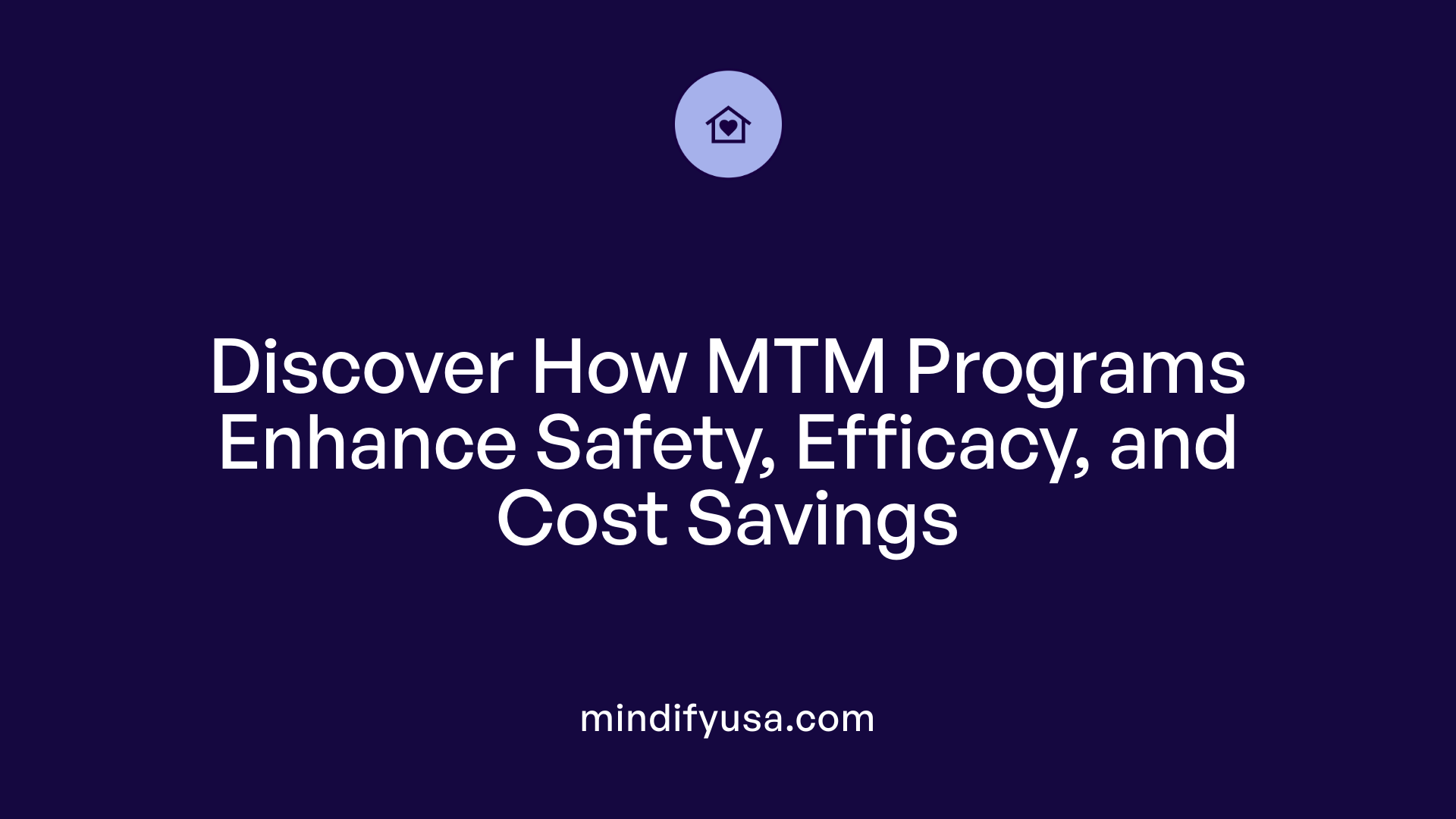
What are the benefits of medication therapy management programs?
Medication therapy management (MTM) programs offer numerous advantages for both patients and the healthcare system. These services are designed to optimize medication use, especially for individuals with multiple chronic conditions or those taking numerous medications.
One of the primary benefits is the enhancement of medication safety and effectiveness. Pharmacists review all prescribed medications, over-the-counter drugs, and supplements to identify potential issues such as drug interactions or improper dosages. This careful review helps prevent adverse drug events and ensures therapies are tailored to individual needs.
MTM also tackles polypharmacy and medication misuse. By assessing each medication’s purpose and reviewing objectives, pharmacists can suggest lower-cost alternatives, discontinue unnecessary drugs, or adjust therapies to minimize risks. This reduces the likelihood of medication-related problems, hospitalizations, and emergency visits.
Patient education is a cornerstone of MTM. Participants learn about their medications, understand how to take them properly, and are encouraged to take an active role in managing their health. This increased awareness fosters better adherence, improved symptom management, and disease control, especially for chronic conditions like diabetes, hypertension, or respiratory diseases.
Cost savings are another important benefit. Through medication reviews and recommendations, MTM programs can lead to lower medication costs and reduce overall healthcare expenditures by preventing costly complications and hospital stays.
Finally, these programs promote care coordination among healthcare providers. Pharmacists work closely with physicians and other health professionals, sharing medication plans and resolving issues collaboratively. This integrated approach ensures consistent and effective patient care.
In summary, MTM programs help improve medication safety, promote effective treatment, empower patients, save costs, and foster safer, more coordinated healthcare environments.
Eligibility Criteria for MTM Services
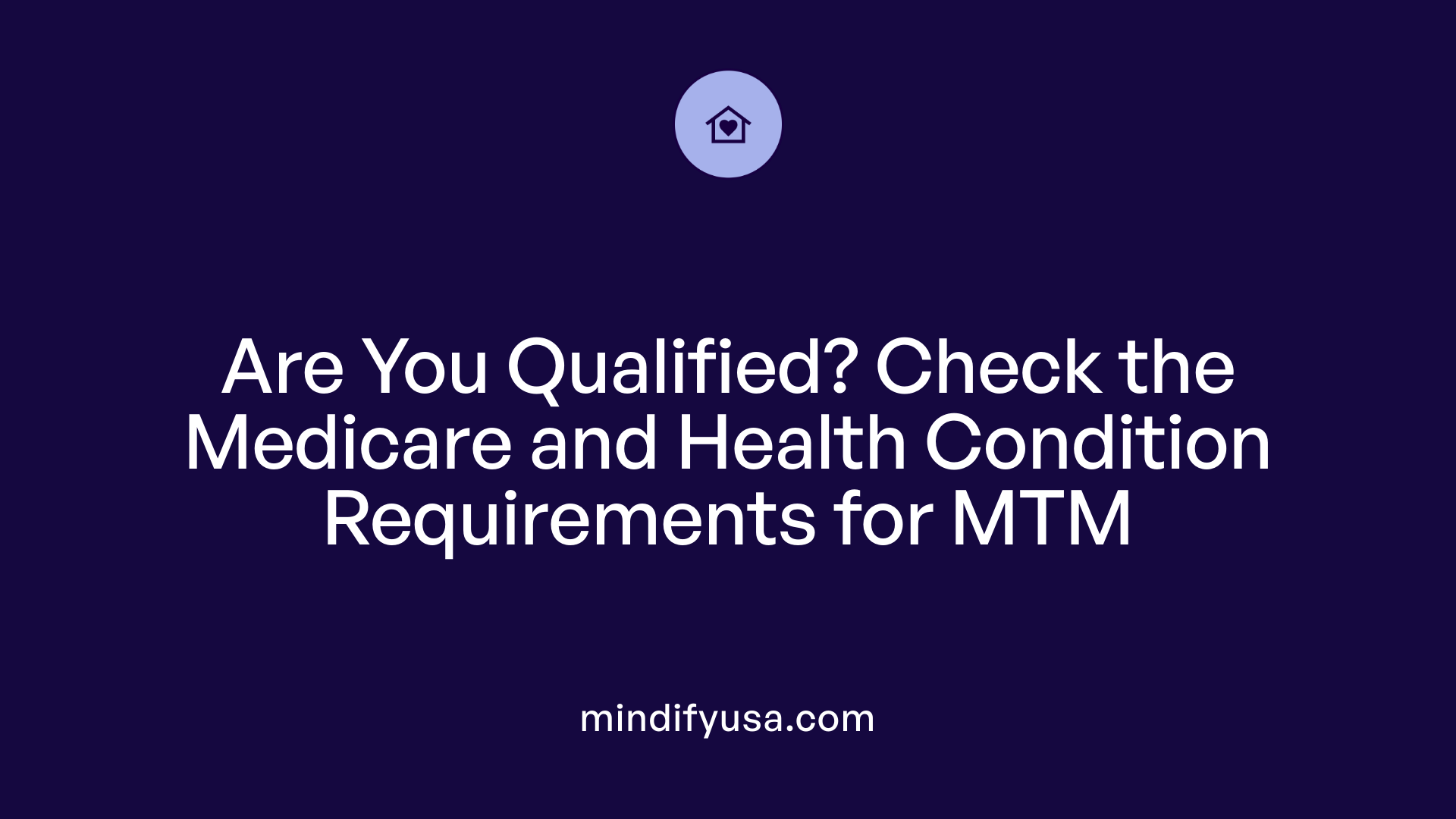
What are the eligibility criteria for medication therapy management (MTM) services?
Eligibility for MTM services often hinges on several factors, particularly the number of chronic conditions, the amount of medications taken, and healthcare costs.
Generally, under Medicare Part D, beneficiaries qualify if they have at least three chronic health conditions such as diabetes, hypertension, or HIV/AIDS. Additionally, they typically must be using between two and eight covered Part D medications per month. Their annual medication costs should exceed a specific threshold; for 2025, this amount is at least $1,623.
Other risk factors can include being at risk for adverse drug events, managing complex medication regimens, or being enrolled in specialized disease management programs like drug management for opioids or benzodiazepines.
Developing the MTM program involves collaboration with licensed and practicing healthcare professionals—primarily pharmacists and physicians—to ensure services are tailored to patient needs.
Once determined eligible, individuals usually undergo an automatic review process based on medication claims data. They receive notification and can opt to participate or decline.
This approach ensures that those who are most likely to benefit from medication management receive proactive support aimed at improving safety, adherence, and overall health outcomes.
The Process and Steps to Qualify
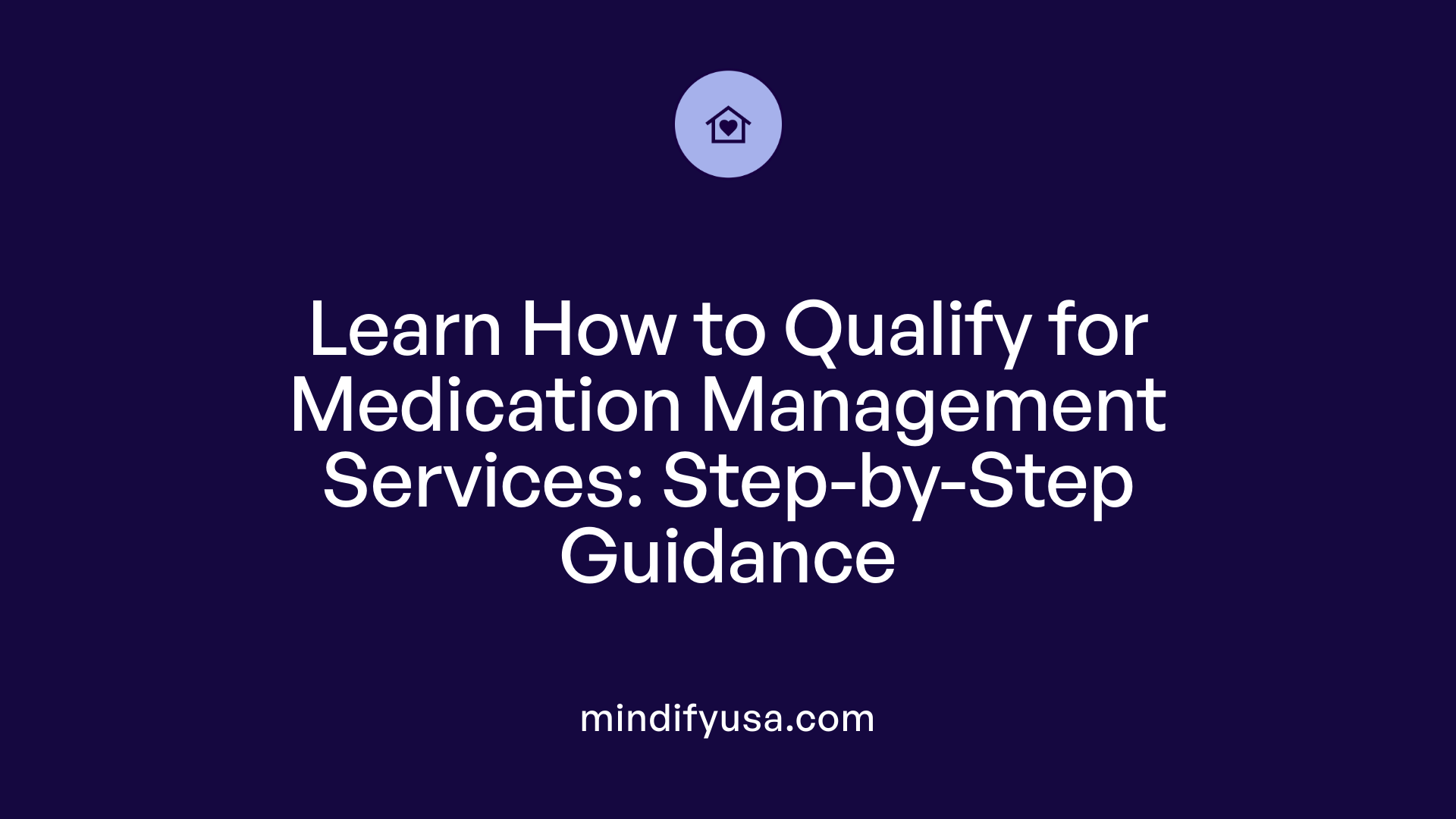
What is the process and what steps are involved in qualifying for medication management services?
Qualifying for medication management services, such as Medication Therapy Management (MTM), begins with identifying patients who could benefit from comprehensive medication reviews and intervention. Healthcare providers, pharmacists, and program administrators evaluate a patient’s medication regimen alongside their health conditions to determine eligibility.
The first step includes assessing medication use, which involves reviewing all prescription medicines, over-the-counter drugs, and supplements a patient is taking. This might require detailed medication reconciliation, sometimes through brown bag reviews where patients bring all medications to appointments. Patients must often meet certain criteria, such as having multiple chronic conditions (typically three or more), taking a specific number of medications (generally eight or more covered drugs), and incurring high medication costs (often over $1,623 annually).
Once eligibility is established, a healthcare professional, frequently a pharmacist, conducts an in-depth evaluation. This assessment helps identify potential medication-related problems like adverse effects, drug interactions, duplications, or non-adherence.
The next step involves developing a personalized medication therapy plan tailored to the patient’s health needs. This plan includes education on medication usage, lifestyle modifications, and monitoring strategies.
The entire process is well-coordinated with health plans or Medicare programs. Proper documentation, including the medical history, medication list, and review outcomes, is essential. Billing and privacy regulations are observed to ensure compliance.
Follow-up visits or reviews are scheduled periodically—quarterly or as needed—to reassess medication effectiveness, adherence, and to make any necessary adjustments. By fulfilling these steps, patients can access ongoing medication management that aims to improve health outcomes, reduce risks, and optimize therapy.
Who Can Perform MTM Services?
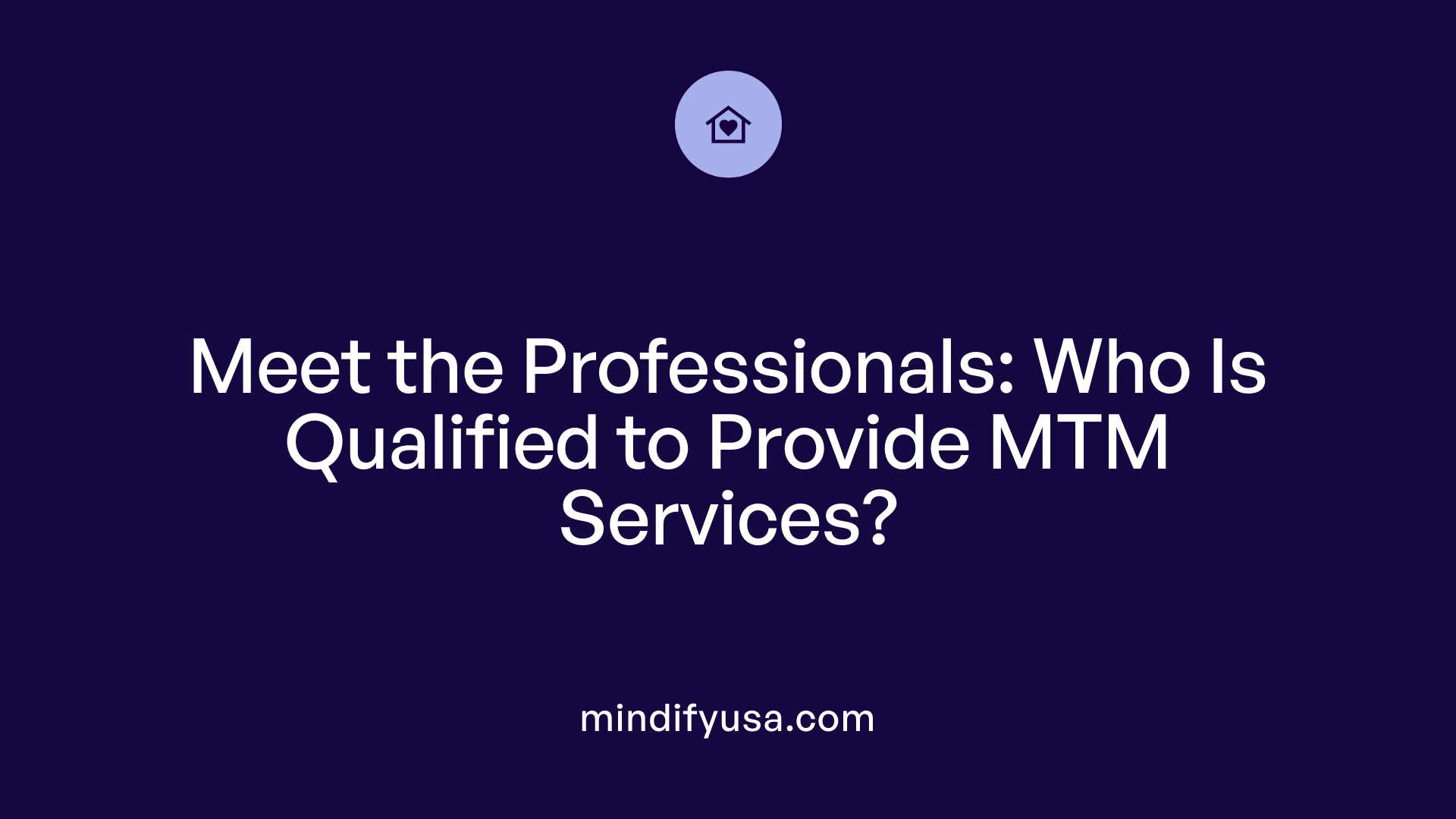
Who can perform medication therapy management (MTM) services?
Medication Therapy Management (MTM) services are primarily performed by licensed healthcare professionals who possess the appropriate credentials. Licensed pharmacists with valid practice licenses in their respective states, territories, or the District of Columbia are authorized to deliver these services, ensuring that medication management aligns with both legal standards and healthcare best practices.
In addition to pharmacists, approved healthcare providers who have completed specialized outcomesMTM training are also authorized to conduct MTM services. This training equips providers with the necessary skills to evaluate medication regimens, identify problems, and coordinate care effectively.
Students working under direct supervision of licensed pharmacists may participate in MTM activities, aiding with documentation and participating in reviews, but they do not independently perform these services.
Pharmacy technicians can assist with documenting and supporting MTM sessions but are not authorized to conduct them without pharmacist oversight.
The development and oversight of MTM programs are carried out in collaboration with licensed pharmacists and physicians to maintain quality and compliance with CMS requirements.
Services are increasingly delivered via telehealth, enabling providers to conduct reviews remotely across state lines, provided all legal and program-specific conditions are met. This expands access and ensures more beneficiaries can benefit from professional medication management.
Additional Considerations and Recommendations
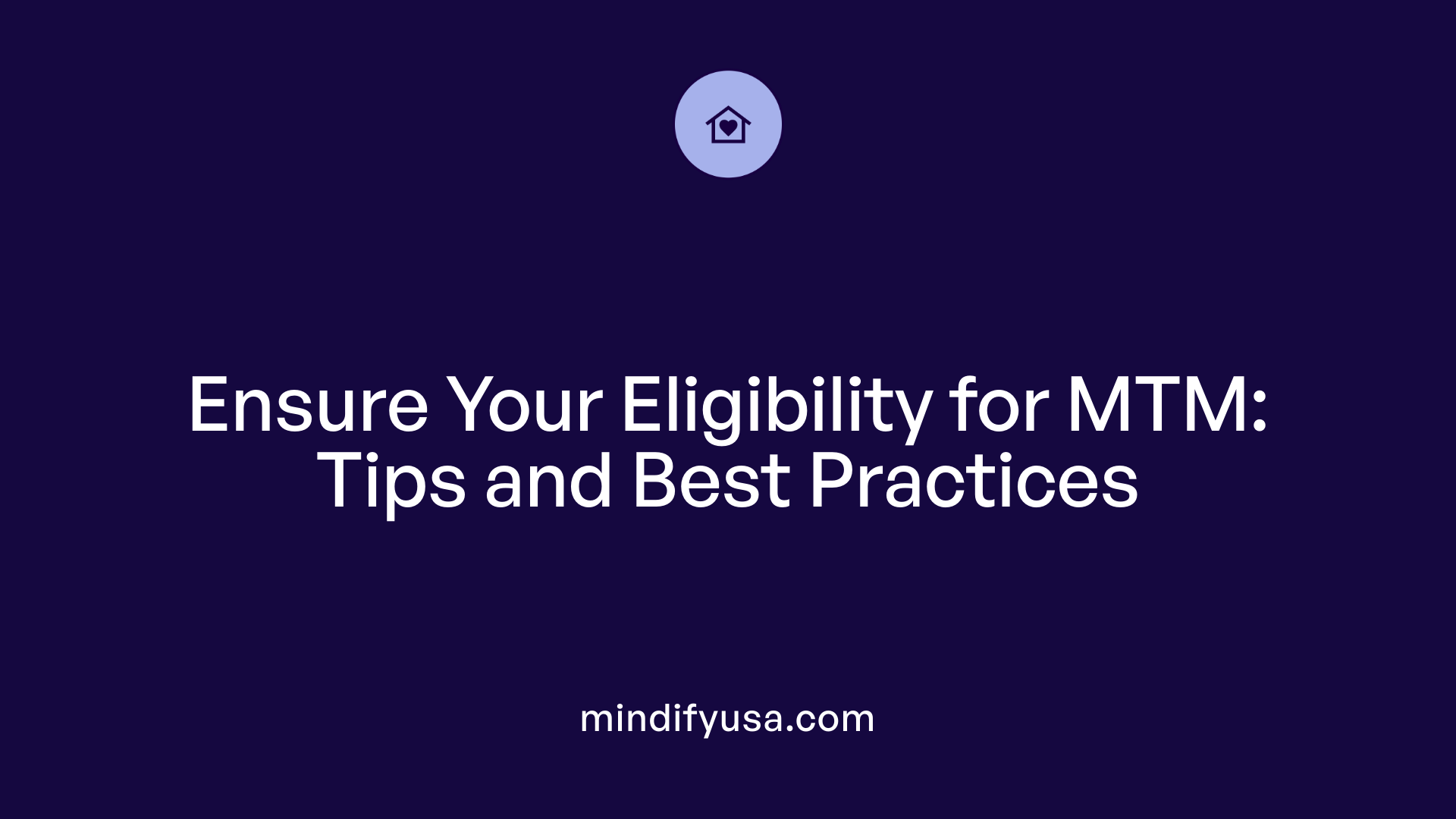
How can I determine if I qualify for medication management or therapy management programs?
To find out if you qualify for programs like MTM under Medicare Part D, review your current medications and healthcare conditions. Generally, you must be taking multiple chronic medications—typically between 2 and 8 or more—and have several long-term health issues such as diabetes, hypertension, or heart failure. You should also expect to spend over $1,623 annually on prescription drugs.
Many beneficiaries are automatically enrolled if they meet these criteria, but it’s a good idea to confirm with your Medicare Part D plan or healthcare provider. They can verify your eligibility based on your medication use and costs. These programs are free and designed to support safe and effective medication use through comprehensive reviews and follow-ups.
Understanding your medication list, knowing your health conditions, and keeping track of your pharmacy costs can help you determine your qualification for MTM services. If you think you might qualify, contact your plan or consult your healthcare provider for a detailed assessment.
Automatic enrollment and voluntary participation
Most eligible members are enrolled automatically in the MTM program once they meet the qualifying conditions. However, participation remains voluntary, meaning you can choose whether to engage with the services or opt out.
Receiving the invitation or notification does not affect your overall Medicare Part D enrollment. You can accept the offer to get personalized medication management or decline if you prefer not to participate.
Preparing medication lists and documentation
Before your medication review, compile a complete list of all your medications, including prescription drugs, over-the-counter products, herbal supplements, and dosages. Having this list ready helps pharmacists and healthcare providers analyze your therapy and identify potential issues.
During reviews, it’s important to document any side effects, concerns, or questions about your medications. Keeping comprehensive records, such as lab results, recent health changes, and medication history, improves the quality of the review and enables tailored recommendations.
Coordination with healthcare providers
Effective medication management relies on collaboration. Pharmacists conducting MTM services often communicate with your physicians to resolve drug therapy problems and optimize your treatment plans.
Make sure to share your medication list and any concerns during your review. Also, keep your healthcare providers informed of any changes in your health or medication regimen. This coordination ensures that your care is consistent and reduces the risk of adverse interactions.
Benefits of early engagement in MTM
Getting involved in MTM early can lead to better health outcomes. It helps identify potential medication problems before they cause serious issues. Early engagement also promotes medication adherence, reduces hospitalizations, and can lower healthcare costs.
Participating in these reviews encourages active involvement in your healthcare. It empowers you to understand your medications better and make informed decisions. Remember, MTM is a voluntary service that can significantly enhance your medication safety and overall well-being.
Getting Started with Medication Management
Qualifying for medication management services, particularly MTM programs, involves understanding the eligibility criteria, assessing your medication use and health conditions, and engaging with your healthcare providers and insurance plans. Remember that these services are designed to support you in managing complex medication regimens safely and effectively. Whether automatically enrolled or through active inquiry, taking advantage of MTM can lead to better health outcomes, fewer medication-related issues, and potential cost savings. Stay proactive by maintaining updated medication lists and coordinating with licensed healthcare professionals to maximize the benefits of these programs and support your ongoing health journey.
References
- Medication Therapy Management - CMS
- Medication Therapy Management Program services
- MTM-Services - DHCS - CA.gov
- Safety checks, drug management programs, and Medication ...
- Medication Therapy Management (MTM) in Medicare Part D
- Medication Therapy Management Program | Aetna Medicare
- [PDF] What is Medication Therapy Management (MTM) - ACCP
- Medication Therapy Management (MTM) Program - Humana






































































































